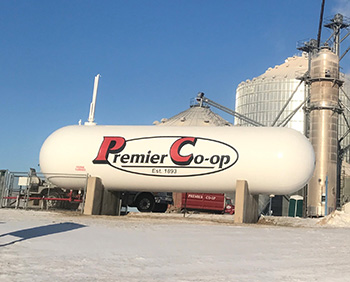Energy Update
Feb 04, 2020

Happy Valentine’s Day! I figured I’d put that out there right away so I don’t forget it. Don’t forget your Valentine this month either. We can warm up your house but we can’t warm up a cold shoulder.
This winter has turned out to be much milder than we expected. We’re about 400 heating degree days less than we would see in a normal year. While it helps the heat bill it doesn’t bode well for those of us who have a passion for snowmobiling. Maybe next month. At this point, maybe next year.
Here’s some more good news. Congress finally retroactively extended the Alternative Fuel Excise Tax Credit from December 31, 2017 through December 31, 2020. They kicked the can a little further down the road but they’ve been busy, right? This extension allows businesses and private individuals to apply for a tax rebate of 36.5 cents per gallon for propane powered vehicles.
My fuel cost savings since purchasing my propane conversion kit (including the tax incentive) is $7500. The propane conversion cost me $5000 installed so I’m now $2500 in the black. I’m planning on driving the wheels off my truck which hopefully will get me to at least 300,000 miles. All things being equal, I should see a savings of almost $23,000 in fuel costs over the life of the vehicle. If I deduct the $5000 it cost me to convert it, I will keep an extra $18,000 in my pocket when the truck is ready for the scrapyard. I don’t know about you but I know I can find a home for that money.
So who can benefit from propane autogas? On average, propane autogas produces 80% less carbon monoxide, 12% less carbon dioxide and 20% less nitrogen dioxide than gasoline. When it comes to diesel, propane autogas emits 28% less carbon monoxide, 18% less less carbon dioxide and 60% less nitrogen dioxide on average. Environmentally, we all can benefit.
Autogas is an ideal fuel for school buses. As kids are getting on and off the bus, they inhale the exhaust from a diesel powered school bus. The World Health Organization and the Environmental Protection Agency says that diesel engine exhaust is a carcinogen that can cause short and long term health problems. Propane autogas is a clean burning fuel that doesn’t expose students to the harmful particulate matter found in diesel exhaust. Propane not only burns cleaner but it is quieter and safer than diesel. And the district can save money through reduced maintenance costs. Lower operating costs equal more dollars for education.
There are currently 12,000 autogas-powerered school buses transporting 700,000 school children every day. We currently work with 9 school districts that operate their own propane buses or contract with companies to haul their kids. If your school district doesn’t have propane buses, you may want to ask why not. No more black smoke, the lowest total cost of ownership, noticeably quieter operation and a much smaller environmental impact.
If you have a business and have a fleet of gasoline powered vehicles, it’s worth looking into. Call me and we can see if it fits your business model. For an individual, if you commute from the west to work in Madison, it may make sense for you to look into it. We have propane autogas dispensers in Mt. Horeb and Dodgeville. The savings may allow you to get a few more bells and whistles for that next vehicle. The Wisconsin Propane Education and Research Council has a $1000 incentive available for vehicles converted to propane to help pay for the conversion or bus. These vehicles can run on gasoline also so there isn’t a concern that you won’t find fuel on long trips.
Here’s another reminder of the Wisconsin Propane Education and Research Council’s Safe Appliance Installation Program. Get a new propane water heater, have it installed, fill out some paperwork and get a check for $200. Call your local Premier Energy location and they’ll hook you up with the paperwork. Thank you for your business.
Tim Lease | Energy Division Manager

This winter has turned out to be much milder than we expected. We’re about 400 heating degree days less than we would see in a normal year. While it helps the heat bill it doesn’t bode well for those of us who have a passion for snowmobiling. Maybe next month. At this point, maybe next year.
Here’s some more good news. Congress finally retroactively extended the Alternative Fuel Excise Tax Credit from December 31, 2017 through December 31, 2020. They kicked the can a little further down the road but they’ve been busy, right? This extension allows businesses and private individuals to apply for a tax rebate of 36.5 cents per gallon for propane powered vehicles.
My fuel cost savings since purchasing my propane conversion kit (including the tax incentive) is $7500. The propane conversion cost me $5000 installed so I’m now $2500 in the black. I’m planning on driving the wheels off my truck which hopefully will get me to at least 300,000 miles. All things being equal, I should see a savings of almost $23,000 in fuel costs over the life of the vehicle. If I deduct the $5000 it cost me to convert it, I will keep an extra $18,000 in my pocket when the truck is ready for the scrapyard. I don’t know about you but I know I can find a home for that money.
So who can benefit from propane autogas? On average, propane autogas produces 80% less carbon monoxide, 12% less carbon dioxide and 20% less nitrogen dioxide than gasoline. When it comes to diesel, propane autogas emits 28% less carbon monoxide, 18% less less carbon dioxide and 60% less nitrogen dioxide on average. Environmentally, we all can benefit.
Autogas is an ideal fuel for school buses. As kids are getting on and off the bus, they inhale the exhaust from a diesel powered school bus. The World Health Organization and the Environmental Protection Agency says that diesel engine exhaust is a carcinogen that can cause short and long term health problems. Propane autogas is a clean burning fuel that doesn’t expose students to the harmful particulate matter found in diesel exhaust. Propane not only burns cleaner but it is quieter and safer than diesel. And the district can save money through reduced maintenance costs. Lower operating costs equal more dollars for education.
There are currently 12,000 autogas-powerered school buses transporting 700,000 school children every day. We currently work with 9 school districts that operate their own propane buses or contract with companies to haul their kids. If your school district doesn’t have propane buses, you may want to ask why not. No more black smoke, the lowest total cost of ownership, noticeably quieter operation and a much smaller environmental impact.
If you have a business and have a fleet of gasoline powered vehicles, it’s worth looking into. Call me and we can see if it fits your business model. For an individual, if you commute from the west to work in Madison, it may make sense for you to look into it. We have propane autogas dispensers in Mt. Horeb and Dodgeville. The savings may allow you to get a few more bells and whistles for that next vehicle. The Wisconsin Propane Education and Research Council has a $1000 incentive available for vehicles converted to propane to help pay for the conversion or bus. These vehicles can run on gasoline also so there isn’t a concern that you won’t find fuel on long trips.
Here’s another reminder of the Wisconsin Propane Education and Research Council’s Safe Appliance Installation Program. Get a new propane water heater, have it installed, fill out some paperwork and get a check for $200. Call your local Premier Energy location and they’ll hook you up with the paperwork. Thank you for your business.
Tim Lease | Energy Division Manager
